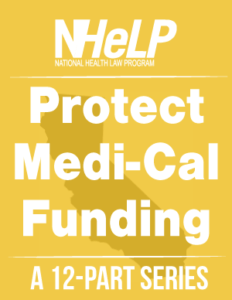 This post is part 11 of our 12-part “Protect Medi-Cal Funding” series. Medi-Cal provides a long-term investment that helps Californians succeed. This blog series highlights the importance of Medi-Cal for various populations in California.
This post is part 11 of our 12-part “Protect Medi-Cal Funding” series. Medi-Cal provides a long-term investment that helps Californians succeed. This blog series highlights the importance of Medi-Cal for various populations in California.
Medi-Cal provides coverage to 2.2 million women of reproductive age in California, and finances half of all births in the state. The program provides comprehensive coverage for pregnant women, including prenatal care, labor and delivery, and prenatal screenings to help detect chromosomal abnormalities, genetic disorders, and birth defects. Medi-Cal pregnancy coverage also continues through a postpartum period of at least 60 days to ensure women have access to ongoing services to address health needs related to their pregnancies. For women who want to end their pregnancies, Medi-Cal also provides comprehensive abortion care.
While the Senate GOP efforts to repeal the Affordable Care Act (ACA) repeal bills were defeated in the early morning hours last Friday, July 28, advocates should remain on alert for continuing efforts to erode the ACA and scale back Medicaid funding through other means, such as budget proposals and even additional proposed legislation. The repeal bills that had been proposed by Congress would have jeopardized the health and financial security of not only women of reproductive age, but the more than 13 million Californians – one third of the state’s residents – who rely on Medi-Cal each year. For example, the Better Care Reconciliation Act (BCRA) originally proposed by Senate Republicans would have cut federal Medicaid spending by $772 billion over ten years and radically restructured Medicaid into a per capita cap program. This restructuring would have shifted the cost to California to the tune of nearly $3 billion in 2020, rising to an annual shift of $30.3 billion by 2027. As wealthy as our state is, there is no way California would have been able to absorb the cost. Faced with such massive cuts in federal funding, the state could have sought to:
- Scale back its income eligibility limits for pregnant women
- Roll back the enhanced services it currently provides through the Comprehensive Perinatal Services Program.
In addition, both the earlier bill passed by the House and the Senate revised BCRA included a provision that prevented Planned Parenthood from participating in the Medicaid program for one year. If put in place, this provision would have prevented pregnant Medi-Cal enrollees from seeing their provider of choice for essential pregnancy-related care including prenatal visits, tests and treatment for sexually transmitted infections, and abortion care. While the Senate Parliamentarian ruled on July 21 that this provision violated the so-called Byrd Rule – meaning that if the Senate proceeded with a vote the provision would be struck absent 60 votes – the provision was subsequently rewritten and added to the new Senate “Skinny Bill” so as to survive a Byrd challenge. Even though congressional repeal efforts have been temporarily stymied, health advocates must remain vigilant against the continued threats that seem likely from the federal administration and congressional leadership who have proven themselves to be staunchly against the best interests of comprehensive reproductive health for all women.
We urge you to read our Protect Medi-Cal Funding Series, Issue Brief #11 for a deeper dive on how Medi-Cal benefits pregnant women in California and how Medicaid cuts would endanger the health access, services, and care that millions of pregnant women in our state rely on every day.
Published Blogs in the Series:
Why Medicaid Cuts Would Harm Health Care for California’s Children
Medi-Cal Cuts Will Harm Health Care for Women In California
Medi-Cal is Critical for Older Adults and Individuals with Disabilities
Medi-Cal Cuts Will Eliminate or Reduce Access to Necessary Services
Medicaid Cuts Would Undermine Medi-Cal’s Ability to Provide Affordable Care to Calif.’s Most Vulnerable People
Proposed Medicaid Cuts Would Endanger Calif.’s Ability to Address Health Disparities
Senate’s Effort to Gut Medicaid Threatens Calif.’s Ability to Provide Care for Women Living with HIV
Republican Policy to Slash Medicaid Funding Would Endanger Calif.’s Enrollment and Coverage Protections

